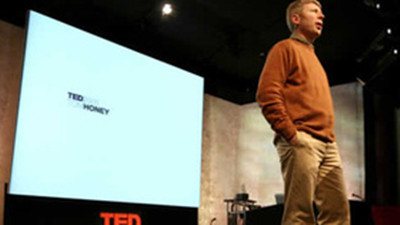In the end, we have to say, I don't know.
最后,我們不得不說,我不知道。
If we knew, God would not be God.
如果我們知道,上帝就不是上帝了。
To have faith in this God would be more like trusting an essential benevolence in the universe,and less like believing a system of doctrinal statements.
相信這個上帝應該更象是相信宇宙中的原善,而不是相信一套教義的陳述。
Isn't it ironic that Christians who claim to believe in an infinite, unknowable being then tie God down in closed systems and rigid doctrines?
基督徒聲稱相信一個無限的、不可知的存在,然后又把上帝束縛在一套封閉的、僵化的教條之中,難道不可笑嗎?
How could one practice such a faith?
怎么能實踐這樣一種信仰?

By seeking the God within. By cultivating my own inwardness.
通過發自內心地尋求上帝;通過培養自己的內在靈性,
In silence, in meditation, in my inner space, in the me that remains when I gently put aside my passing emotions and ideas and preoccupations.
在靜默中,在冥想中,在我的內心世界中,在我輕輕放下暫時的情緒、想法和成見之后依然存在的這個本我中,
In awareness of the inner conversation.
在內省的意識中。
And how would we live such a faith? How would I live such a faith?
我們如何活出這樣一種信仰?我自己怎樣才能活出這樣一種信仰?
By seeking intimate connection with your inwardness.
這需要通過尋求與你的內在靈性的密切關系,
The kind of relationships when deep speaks to deep.
那是一種推心置腹交談時毫不遮掩的關系。
If God is in all people, then there is a meeting place where my relationship with you becomes a three-way encounter.
如果上帝存在于所有人之中,那么在我與你之間就有一個我們三方能彼此相遇的一個地方。
There is an Indian greeting, which I'm sure some of you know:
印度有一句問候語,肯定你們當中有些人知道:
Namaste, accompanied by a respectful bow,which, roughly translated means,that which is of God in me greets that which of God is in you.
那馬斯特,伴隨一個恭敬的鞠躬。其大致的意思是我內在的上帝問候你內在的上帝。
Namaste.
那馬斯特。
And how would one deepen such a faith?
那么我們如何深化這種信仰?
By seeking the inwardness which is in all things.
這需要通過尋求在所有事物中的內在靈性。
In music and poetry, in the natural world of beauty and in the small ordinary things of life,there is a deep, indwelling presence that makes them extraordinary.
在音樂和詩歌中,在自然界的美麗中,在平凡的生活瑣事中,都有一個深刻的、內在的存在使這些東西不平常。
It needs a profound attentiveness and a patient waiting,a contemplative attitude and a generosity and openness to those whose experience is different from my own.
它需要一種深邃的注意力和耐心的等待,一個沉思的態度,以及對與自己的經歷不同的人的慷慨大方和開放包容。
When I stood up to speak to my people about God and the tsunami,I had no answers to offer them.
當我站起來向我們教會的人講述上帝和海嘯時,我無法為他們提供答案。
No neat packages of faith, with Bible references to prove them.
圣經沒有提供一套現成的套路和說詞來證明,
Only doubts and questioning and uncertainty.
只有懷疑、質問和不確定。
I had some suggestions to make possible new ways of thinking about God.
我提出了一些建議,一些關于上帝的可能的新思路,
Ways that might allow us to go on, down a new and uncharted road.
這些思路或許能使我們沿著一條新的未知的道路繼續走下去。
But in the end, the only thing I could say for sure was, I don't know,and that just might be the most profoundly religious statement of all.
但最后,我唯一可以肯定說的是,我不知道。這也許正是最深刻虔誠的聲明。
Thank you.
謝謝。











